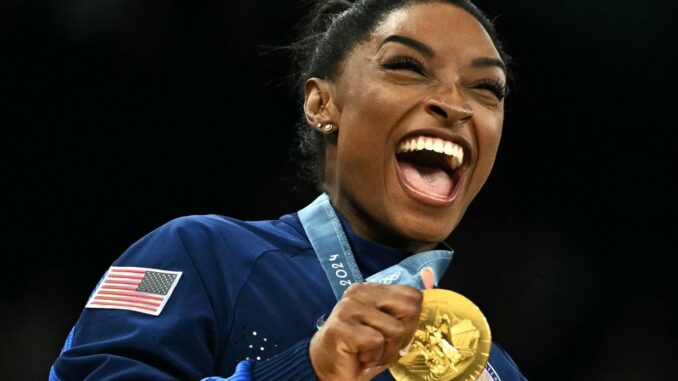
The feud between gymnastics legend Simone Biles and conservative commentator Riley Gaines just went nuclear – and fans are now choosing sides in a battle that’s got social media in full meltdown mode. It all started when Gaines criticized the Minnesota State High School League for celebrating a softball championship victory led by junior pitcher Marissa Rothenberger – a biological male – who dominated the playoffs with five straight wins and just one earned run in 35 innings.
In the world of sports, athletes often become symbols of excellence and inspiration. However, when personal beliefs and public statements collide, the results can be explosive. Such is the case with Olympic gymnast Simone Biles and former NCAA swimmer Riley Gaines. What began as a debate over transgender athletes in women’s sports has escalated into a full-blown online feud, reignited by a tweet from 2017. This article delves into the origins of this conflict, the key players involved, and the broader implications for sports and society.
The Origins of the Feud
Simone Biles: A Champion for Inclusion
Simone Biles is widely regarded as one of the greatest gymnasts of all time. With 11 Olympic medals and 30 World Championship medals, her accolades speak volumes about her talent and dedication . Beyond her athletic prowess, Biles has been an advocate for mental health awareness and inclusivity in sports. She has consistently supported the participation of transgender athletes in women’s sports, emphasizing the importance of creating a welcoming environment for all competitors.
Riley Gaines: A Vocal Opponent
Riley Gaines, on the other hand, has become a prominent figure in the debate against transgender women competing in women’s sports. Gaining national attention after tying with transgender swimmer Lia Thomas at the 2022 NCAA Championships, Gaines has since used her platform to advocate for policies that would restrict transgender women from participating in women’s athletic events .
The 2017 Tweet: A Blast from the Past
In June 2025, Riley Gaines unearthed a 2017 tweet from Simone Biles that seemed to contradict her current stance on transgender athletes. The tweet suggested that allowing male athletes to compete in women’s events would lead to dominance by male competitors. Gaines highlighted this inconsistency, accusing Biles of hypocrisy and questioning her commitment to fairness in women’s sports .
The Social Media Showdown
Biles Responds
Simone Biles did not take kindly to Gaines’ accusations. She labeled Gaines a “truly sick bully” and accused her of being a sore loser, referencing Gaines’ controversial tie with Lia Thomas. Biles defended her current position, advocating for the inclusion of transgender athletes and proposing the creation of a third category to accommodate them .
Gaines Fires Back
Not one to back down, Riley Gaines responded by accusing Biles of body-shaming and invoking Biles’ past trauma with Larry Nassar. Gaines argued that Biles’ stance undermines equal opportunity in women’s sports and could compromise hard-won achievements .
Public Reactions and Media Involvement
Danica Patrick Weighs In
Former NASCAR and IndyCar driver Danica Patrick publicly supported Riley Gaines in the heated social media dispute with Simone Biles. Patrick, who revealed she had “taken the red pill,” backed Gaines’ stance that biological men should not compete in women’s sports .
The Role of Media
The media has played a significant role in amplifying this feud. Outlets have covered every tweet and response, turning a personal disagreement into a national conversation about fairness, inclusion, and the future of women’s sports.
The Broader Debate: Transgender Athletes in Women’s Sports
The Case for Inclusion
Proponents of transgender inclusion argue that sports should be accessible to all individuals, regardless of gender identity. They emphasize the importance of creating policies that allow transgender athletes to compete in a way that aligns with their gender identity, ensuring fairness and inclusivity.
The Case for Fairness
Opponents, like Riley Gaines, contend that allowing transgender women to compete in women’s sports creates an uneven playing field. They argue that transgender women may have physical advantages that could compromise the fairness of competition and the opportunities available to cisgender women.
Implications for the Future
Policy Changes
This ongoing debate is prompting organizations to reevaluate their policies regarding transgender athletes. Some are considering implementing separate categories for transgender competitors, while others are exploring ways to ensure fair competition without compromising inclusivity.

Public Perception
The public’s perception of this issue is divided. Some view the inclusion of transgender athletes as a necessary step toward equality, while others see it as a threat to the integrity of women’s sports. This division is reflected in the polarized reactions to the Simone Biles and Riley Gaines feud.
Conclusion: A Divisive Issue
The clash between Simone Biles and Riley Gaines underscores the deep divisions within society regarding the inclusion of transgender athletes in women’s sports. While both women are champions in their own right, their differing views highlight the complexities of balancing inclusivity with fairness. As this debate continues, it will undoubtedly shape the future of sports and the policies that govern them.